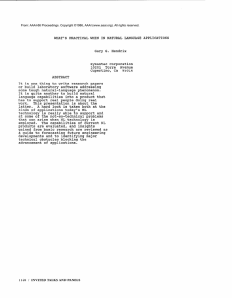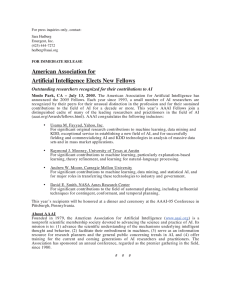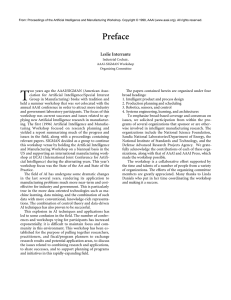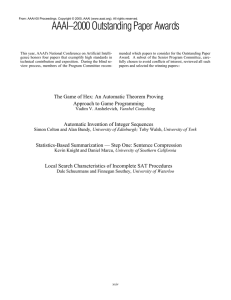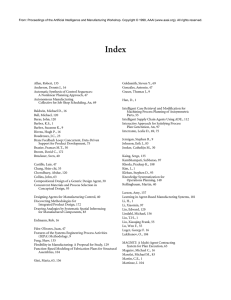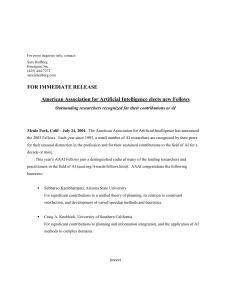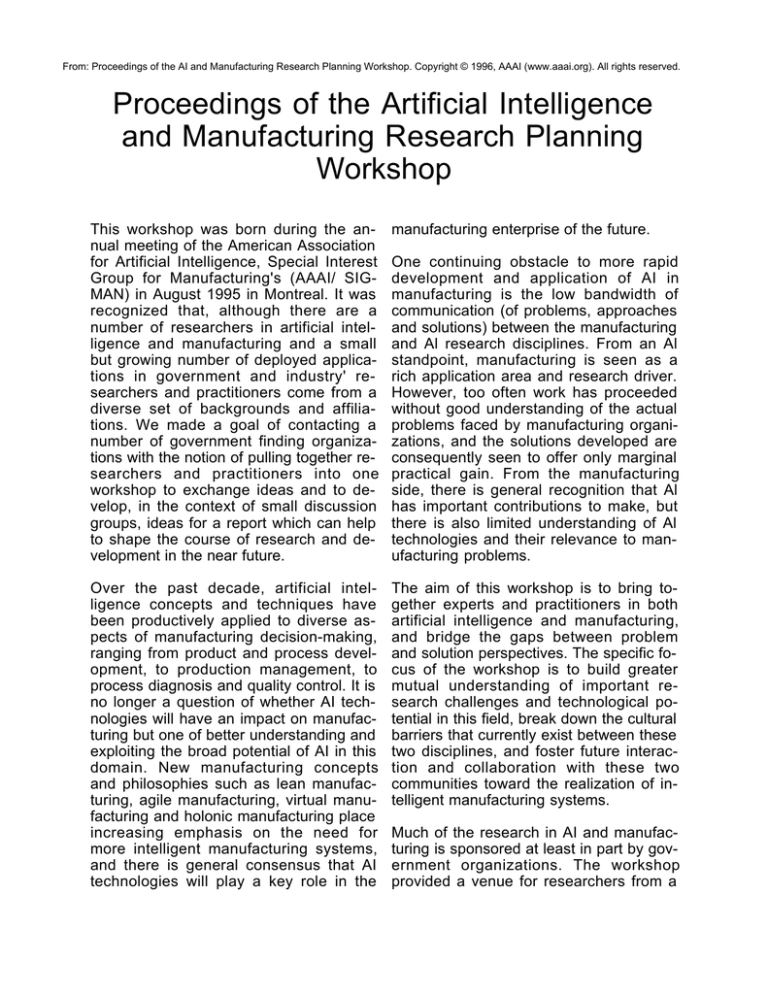
From: Proceedings of the AI and Manufacturing Research Planning Workshop. Copyright © 1996, AAAI (www.aaai.org). All rights reserved.
Proceedings of the Artificial Intelligence
and Manufacturing Research Planning
Workshop
This workshop was born during the annual meeting of the American Association
for Artificial Intelligence, Special Interest
Group for Manufacturing's (AAAI/ SIGMAN) in August 1995 in Montreal. It was
recognized that, although there are a
number of researchers in artificial intelligence and manufacturing and a small
but growing number of deployed applications in government and industry' researchers and practitioners come from a
diverse set of backgrounds and affiliations. We made a goal of contacting a
number of government finding organizations with the notion of pulling together researchers and practitioners into one
workshop to exchange ideas and to develop, in the context of small discussion
groups, ideas for a report which can help
to shape the course of research and development in the near future.
manufacturing enterprise of the future.
Over the past decade, artificial intelligence concepts and techniques have
been productively applied to diverse aspects of manufacturing decision-making,
ranging from product and process development, to production management, to
process diagnosis and quality control. It is
no longer a question of whether AI technologies will have an impact on manufacturing but one of better understanding and
exploiting the broad potential of AI in this
domain. New manufacturing concepts
and philosophies such as lean manufacturing, agile manufacturing, virtual manufacturing and holonic manufacturing place
increasing emphasis on the need for
more intelligent manufacturing systems,
and there is general consensus that AI
technologies will play a key role in the
The aim of this workshop is to bring together experts and practitioners in both
artificial intelligence and manufacturing,
and bridge the gaps between problem
and solution perspectives. The specific focus of the workshop is to build greater
mutual understanding of important research challenges and technological potential in this field, break down the cultural
barriers that currently exist between these
two disciplines, and foster future interaction and collaboration with these two
communities toward the realization of intelligent manufacturing systems.
One continuing obstacle to more rapid
development and application of AI in
manufacturing is the low bandwidth of
communication (of problems, approaches
and solutions) between the manufacturing
and Al research disciplines. From an Al
standpoint, manufacturing is seen as a
rich application area and research driver.
However, too often work has proceeded
without good understanding of the actual
problems faced by manufacturing organizations, and the solutions developed are
consequently seen to offer only marginal
practical gain. From the manufacturing
side, there is general recognition that Al
has important contributions to make, but
there is also limited understanding of Al
technologies and their relevance to manufacturing problems.
Much of the research in AI and manufacturing is sponsored at least in part by government organizations. The workshop
provided a venue for researchers from a
From: Proceedings of the AI and Manufacturing Research Planning Workshop. Copyright © 1996, AAAI (www.aaai.org). All rights reserved.
The workshop is a collaborative effort
supported by the tune and talents of a
number of people Dom a variety of organizations. Their efforts are greatly appreciated. Mark Boddy assisted with the workshop agenda and speaker suggestions,
Maria Gini posted workshop announcements in the AAAI/SIGMAN newsletter
and on the web, George Luger coordinatSpecific topics of interest include Al in ed the Proceedings effort, John Mitchiner
venous manufacturing life-cycle activities' organized the workshop tours, Bill Regli
including design, engineering, production assisted with finding efforts, Steve Smith
planning, scheduling and control, process handled the workshop funds, and Kelly
diagnosis and control, recycling and re- Gomez assisted in many ways with workmanufacturing; AI and business process shop preparation. Many thanks to Patti
reengineering; AI and issues of enterprise Sanchez who put in her time coordinating
integration, including enterprise model- the workshop and making it a success.
ing, architectures for coordination and
collaborative, distributed decision-making Leslie lnterrante, Chair
the role of AI in supporting new manufacturing concepts such as agility, virtual
manufacturing, etc.
variety of government organizations along
with their industry contractors to exchange
information regarding relevant technologies with academic and industry researchers. We hope that such an exchange will enhance research efforts by
unifying researchers of like interests from
a variety of organizations.
To emphasize broad-based coverage and
consensus on issues, we solicited participation from within the programs of several
organizations that sponsor or are otherwise involved in intelligent manufacturing
research, including the National Science
Foundation,
Sandia
National
Laboratories/Department of Energy, the
National Institute of Standards and Technology, and the Advanced Research Projects Agency. We gratefully acknowledge
the contributions of each of these organizations, along with that of AAAI Press,
which made the workshop possible.
From: Proceedings of the AI and Manufacturing Research Planning Workshop. Copyright © 1996, AAAI (www.aaai.org). All rights reserved.
Sponsors
American Association for Artificial
Intelligence, Special Interest Group in
Manufacturing (AAAI/SIGMAN)
National Science Foundation, Knowledge
Models and Cognitive Systems (NSF)
Sandia National Laboratories/Department of
Energy (DOE)
National Institute of Standards and
Technology (NIST)
Advanced Research Projects Agency (ARPA)
From: Proceedings of the AI and Manufacturing Research Planning Workshop. Copyright © 1996, AAAI (www.aaai.org). All rights reserved.
Organizing Committee
Workshop Chair
Leslie D. Interrante, Sandia National Laboratories
Organizing Committee
Leslie D. Interrante, Sandia National Laboratories,
Mark S. Boddy, Honeywell Corporation
Barry Fox, McDonnell Douglas Corporation
Maria L. Gini, University of Minnesota
George F. Luger, University of New Mexico
John L. Mitchiner, Sandia National Laboratories
Dana S. Nau, University of Maryland
William Regli, National Institute of Standards and
Technology
Norman M. Sadeh, Carnegie Mellon University
Stephen F. Smith, Carnegie Mellon University
Simon Szykman, National Institute of Standards and
Technology

